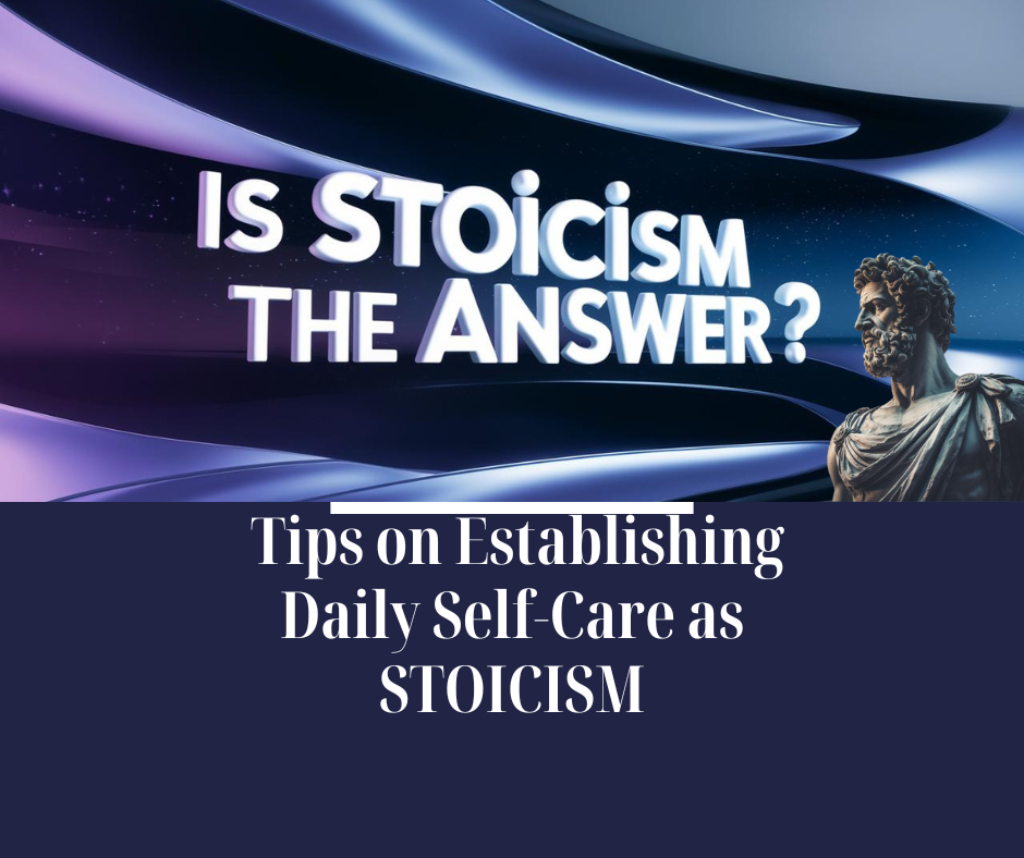
Stoicism is an old Greek philosophy that stresses virtue in individuals, overcoming hardship with
fortitude, and achieving inner peace by exercising restraint and accepting the things we cannot
alter. Fundamentally, stoicism embraces the unpredictable nature of the outside world while
encouraging people to concentrate on the things they can control, such as their ideas, attitudes, and
behaviors.
Stoic philosophy acknowledges that life is full of obstacles and unknowns, but instead of letting
them overcome them, people may build mental toughness by incorporating justice, bravery,
temperance, and reason into their lives.
We see similarities between gradual progress and Stoic philosophy when we think about
incorporating these ideas into regular self-care practices. Small, regular acts add up to meaningful
long-term outcomes, according to stoicism. This is in line with the idea that we should modify our
self-care routines in small, doable steps to attain general well-being.
In self-care, we may concentrate on manageable factors, such as our food habits, sleep patterns,
stress management, and alcohol use, realizing that these are areas where we have direct effects,
much as Stoicism encourages us to focus on what we can control. People might approach self-care
as a series of manageable incremental steps rather than as a daunting overhaul by adopting the
Stoic idea of steady development.
Stoic self-care, for example, can entail committing to one little adjustment every day or every
week, such as choosing water over sugary beverages or adding more vegetables to meals, rather
than trying to make a drastic nutritional overhaul overnight. This strategy is consistent with the
tenets of stoicism, which emphasize living in the present and choosing actions that are under one’s
direct control.
Essentially, the comparison between daily self-care and stoicism highlights the transformational
potential of little, continuous gains. It pushes people to embrace an attitude that prioritizes ongoing
development above quick perfection, creating long-lasting adjustments that improve well-being
The 1% Philosophy in Self-Care
The goal behind the “1% philosophy” in self-care is to enhance one’s routines or habits gradually
and subtly. It is predicated on the idea that minor, persistent adjustments—as little as 1% every
day—can result in major, long-lasting gains in general well-being.
The phrase “1% philosophy” refers to a dedication to consistently making little improvements or
modifications. Even while these adjustments appear little at first, they add up over time to have a
major impact. This strategy supports the notion that making little, controllable changes over time
is frequently more sustainable and feasible than making large, abrupt changes all at once.
Why is 1% important? The cumulative effect of the 1% concept is what makes it significant. Even
though a 1% improvement might not seem like much at first, over days, weeks, and months, the
cumulative effect of these tiny gains can produce amazing changes.
Think about the financial example of compound interest: modest changes in self-care practices
over time compound to build a healthier and happier lifestyle, just as a modest sum of money spent
regularly over time rises dramatically due to compounding.
The 1% method also has psychological advantages. It lessens the overload that frequently follows
significant lifestyle changes. Greater objectives are more attainable and sustained when broken
down into smaller, more doable steps. This lowers the risk of burnout or stopping self-care
routines.
If people concentrate on little steps, they will be more likely to maintain these changes over time,
which will give them a feeling of empowerment and success when they see the slow but noticeable
gains in their health and well-being.
In the end, the significance of the 1% philosophy in self-care lies in its emphasis on the ability of
constancy, endurance, and patience to bring about long-lasting beneficial transformations. This
encourages people to go on their road of self-improvement with reasonable and attainable
objectives.
Healthier Eating Habits
Mindful Nutrition

- Recognizing Nutritional Requirements: Learn about the various foods’ nutritional content.
Prioritize eating a well-balanced diet that includes whole grains, fruits, vegetables, lean meats, and
healthy fats. - Portion Control: Pay attention to serving sizes to prevent overindulging. Recognize your signs
of hunger and fullness to control how much food you eat. - Avoiding Processed Foods: Limit your intake of highly processed and sugar-laden meals.
Choose nutrient-dense, entire, unprocessed foods. - Hydration: Make sure you are well hydrated by consuming water throughout the day.
Implementing Changes: - Gradual Shifts: Begin with little adjustments. For example, add a serving of veggies to one meal
a day. - Meal Planning: Arrange your meals in advance to guarantee a healthy, well-balanced diet.
Incorporate a range of meals to fulfill various dietary requirements. - Cooking at Home: To have greater control over ingredients and cooking techniques, prepare
meals more frequently at home. - Mindful Eating Practices: Take your time, enjoy every bite, and be aware of your emotions while
you consume different meals. - Maintaining a Food Journal: Record your meals to better understand your eating patterns and
pinpoint areas for development.
People may make the shift to healthy eating habits without feeling overwhelmed if these
adjustments are made gradually. Recall that progress, not perfection, is the aim. In the process of
making these adjustments to a healthy lifestyle, acknowledge your little accomplishments along
the way and practice self-compassion.
The Stoic Diet: Nourishing Body and Mind
In Stoic philosophy, the “stoic diet” is more than just eating right. It’s about feeding both your body and your mind. Stoics saw a deep link between what we eat and how we feel inside and out.
The core of the stoic diet is simple, moderate eating, and being mindful. Stoics pushed for eating whole, unprocessed foods. These foods help with health and thinking skills. They focus on:
- Whole grains, such as quinoa, oats, and brown rice, for sustained energy and fiber
- Lean proteins, like chicken, fish, and legumes, to maintain muscle mass and repair tissue
- Fruits and vegetables, brimming with antioxidants and vitamins to boost immunity
- Healthy fats, such as those found in avocados, nuts, and olive oil, for brain health and heart function
Eating mindfully is also key in the stoic diet. Stoics saw meals as a time for thought, thanks, and enjoying simple foods. Being fully present at meals helps us value our food more. This nourishes both our body and mind.
| Stoic Dietary Principles | Benefits |
|---|---|
| Whole, unprocessed foods | Optimal nutrient density, reduced inflammation, and improved gut health |
| Moderation and portion control | Balanced energy levels, weight management, and digestive well-being |
| Mindful eating practices | Enhanced mental focus, reduced stress, and a deeper connection with the act of nourishment |
Following the stoic diet helps us use food to feed our bodies and minds. It’s a way of life that shows how our daily food choices affect our health and happiness.
Prioritizing Adequate Sleep
Getting enough sleep is essential for general health and well-being. It is essential for many areas
of both mental and physical functioning.
The function of sleep
- Restoration and Repair: Sleep promotes general physical health by enabling the body to renew
and repair tissues. - Cognitive Function: Getting enough sleep improves focus, output, and cognitive functions
including learning and remembering. - Emotional Well-Being: Sleep affects emotional stability and mood management.
- Immune Function: Getting enough sleep helps maintain a strong immune system, which helps
people avoid and recover from illnesses.
Methods to Improve Your Sleeping Patterns: - Maintain a Regular Sleep Schedule: Even on weekends, keep a regular sleep schedule by going
to bed and getting up at the same time every day. - Establish a Calm Bedtime Routine: Read, do some light stretching, or practice meditation before
bed to let your body know it’s time to unwind. - Optimize Your Sleep Environment: Make sure your bedroom is quiet, dark, and at a temperature
that is pleasant for sleeping in. - Minimize Screen Time: Because blue light from screens might interfere with sleep patterns,
limit your time spent using them (TVs, PCs, and phones) at least an hour before bed. - Mindful Eating and Drinking: Steer clear of large meals, coffee, and a lot of beverages just
before bed to avoid discomfort or numerous nighttime awakenings. - Regular Exercise: Get your body moving regularly, but steer clear of strenuous exercise right
before bed because it might be stimulating. https://amzn.to/3XhoOaH
Cultivating a Stoic Sleep Routine

As stoics, we know how crucial a good sleep routine is for our well-being. Quality sleep refreshes our bodies and helps us think clearly and feel balanced. This is key for dealing with life’s ups and downs.
Creating an Environment Conducive to Restful Sleep
Stoics believe in making a sleep space that helps you relax and avoid distractions. This means keeping your bedroom cool, dark, and quiet. It should be free from devices and thoughts that keep you awake.
- Establish a consistent sleep schedule, aiming for 7-9 hours of sleep each night.
- Invest in a comfortable, supportive mattress and bedding to ensure your physical comfort.
- Minimize exposure to blue light from electronic devices before bedtime, as it can disrupt our natural sleep-wake cycle.
- Incorporate soothing elements, such as calming scents or soft music, to create a tranquil atmosphere.
By following a stoic sleep routine and making your sleep space relaxing, you’re taking a big step. You’re keeping your mind, body, and spirit in balance. This is what the stoic lifestyle is all about.
| Stoic Sleep Habits | Benefits |
|---|---|
| Consistent Sleep Schedule | Improved Circadian Rhythm and Sleep Quality |
| Minimized Blue Light Exposure | Enhanced Melatonin Production and Natural Sleep Cycle |
| Soothing Sleep Environment | Reduced Stress and Anxiety, Deeper Relaxation |
“The bed is a place of meditation on the tranquility of life.” – Marcus Aurelius
Relaxation Techniques for the Stoic Soul
As Stoics, we know how vital it is to keep our minds balanced and calm. Life can be demanding, so we need practices that help us relax, meditate, and be mindful. These methods ease stress and improve our mental and physical health.
Mindfulness Meditation: A Stoic’s Path to Inner Peace
Mindfulness meditation is key for Stoics seeking peace and clarity. It lets us focus on now, quiet our minds, and find deeper awareness. This practice helps us drop anxious thoughts, stay calm, and face challenges with ease.
- Start with a few minutes of meditation each day, then add more time as you get used to it.
- Choose a quiet spot to sit comfortably and pay attention to your breath. Let it guide your focus.
- If your mind drifts off, gently bring it back to now. Just notice your thoughts without judging them.
Adding stoic meditation to our daily life changes us. It brings deep relaxation and mental health benefits.
“The greatest weapon against stress is our ability to choose one thought over another.” – William James
By living the Stoic way of discipline and awareness, we can make mindfulness a daily habit. This practice supports our self-care and helps us deal with life’s challenges better.
https://amzn.to/3WZXwV2
Stoic Exercise: Strengthening Mind and Body
For the Stoics, exercise was more than just looking good. It was key to a balanced life. They saw a deep link between the body and mind. They used exercise to improve stoic health and stoic wellness.
The Stoic way of stoic exercise was all about discipline. They thought regular, meaningful physical activity helped build mental strength. By doing stoic physical activity, one could boost their body and mind. This helped them face life’s challenges with calm and focus.
The Stoics liked many stoic fitness activities. These included walking, swimming, wrestling, and combat training. They aimed to pick exercises they enjoyed and could stick with.
“The body is the soul’s instrument, and must be kept in good repair.” – Epictetus
Stoics added stoic exercise to their daily life. This helped them keep a balance between their body and mind. This approach kept them strong in stoic health and stoic discipline through tough times.
Today, the Stoic ideas on health and fitness are still important. By following the Stoic view on stoic exercise, we can use movement to make our bodies and minds stronger. This leads to a greater sense of stoic wellness and resilience in our everyday lives.
Is stoicism the answer?
In today’s fast-paced world, the old philosophy of Stoicism is gaining popularity. It’s a way to take care of ourselves and grow personally. This ancient wisdom helps us find meaning and strength in our chaotic lives.
Stoicism’s Enduring Relevance in Today’s World
Stoicism teaches us to focus on what we can control, be virtuous, and accept the now. These ideas are very relevant today. Stoicism in modern life helps us achieve inner peace and emotional balance.
It tells us to look inside ourselves for happiness, not just at what we have. By living by Stoic values like wisdom and courage, we can handle life’s challenges better. This approach gives us a clear direction and purpose.
Stoicism also teaches us to live in the moment. This is a great way to deal with today’s constant distractions and worries. Stoicism’s relevance comes from helping us stay focused and find happiness, even in a busy world.
| Stoic Principles | Benefits in Modern Life |
|---|---|
| Focus on What Is in Your Control | Fosters a sense of agency and resilience in the face of life’s challenges |
| Cultivate Virtue and Character | Provides a framework for personal growth and ethical living |
| Embrace the Present Moment | Helps reduce anxiety and promote mindfulness and contentment |
Today, we face many challenges, but Stoicism’s principles offer a helpful way to deal with them. By applying these ancient teachings, we can find peace and strength. This approach helps us thrive in our complex world.
Stoic Journaling: Reflecting on Daily Practice
https://amzn.to/4gfaozt
Stoic journaling is a great way to reflect and grow. It helps us think about our thoughts, feelings, and life events. By doing this, we learn more about our daily Stoicism practice. It shows us what we need to work on, helps us understand Stoic ideas better, and makes us more aware of ourselves.
Prompts for Stoic Self-Reflection
Here are some prompts to make the most of your journaling:
- Think about how you reacted to things that happened today. How did you handle tough moments? How can Stoic ideas help you feel better about your feelings?
- Find times when you felt stoic mindfulness today. When did you stay calm and focus on what you can control?
- Look at how you’ve grown by following stoic daily practices. What new habits have you started? How have they made you feel better?
- Think about how stoic self-awareness affects your choices. How can you learn more about your strengths, weaknesses, and what matters most to you?
- Wonder how you can use stoic principles to grow more and be stronger when things get hard.
Doing this kind of stoic journaling regularly helps you see your progress. It shows you what you need to work on. And it makes you understand Stoicism’s wisdom even better.
“The soul becomes dyed with the color of its thoughts.” – Marcus Aurelius
Stoic Relationships: Cultivating Meaningful Connections
In Stoic philosophy, relationships are more than just social chats. They are chances to grow in stoic empathy and stoic compassion. By using Stoic ways, people can improve their stoic interpersonal skills. This helps them have deeper stoic social interactions.
At the core of Stoic relationships is stoic communication. Stoics value active listening, being honest, and understanding each other. By not judging and staying in the now, people can feel more empathy. This lets them connect deeply with others.
| Stoic Relationship Principles | Key Practices |
|---|---|
| Empathy | Actively listening, suspending judgment, and seeking to understand others’ perspectives |
| Compassion | Offering support, kindness, and a willingness to help without expecting anything in return |
| Authenticity | Honest self-expression, vulnerability, and a commitment to being true to oneself |
By following these Stoic ideas, people can make stoic relationships that are rewarding. They focus on growing personally, being emotionally smart, and caring for the greater good. This helps Stoics build connections that make life better for everyone involved.
“The key to living well is to be mindful of our relationships, and to attend to them with care, diligence, and wisdom.” – Marcus Aurelius, Meditations
The Stoic way of dealing with relationships stresses knowing oneself, being empathetic, and focusing on what you can control. By living by these ideas, people can handle life’s challenges better. They can build the stoic relationships that are key to a happy and meaningful life.
Integrating Stoic Principles into Work and Study
As Stoics, we see the value of stoic work habits and focus in tough situations. These principles help us in both work and school. They guide us through the challenges and stress of our daily tasks.
Staying Focused and Resilient in Challenging Environments
Stoicism teaches us about stoic resilience. This means staying calm and steady when things get hard. With this strength, we can overcome obstacles and stay focused on our goals.
Stoics also value stoic focus. This means keeping our minds on what we’re doing, no matter what. With discipline and self-control, we can do well in our jobs and studies. We often do better than those who give in to quick rewards or emotions.
- Keep a clear mind with regular stoic meditation and thinking about ourselves.
- Have a routine that helps with stoic productivity and managing time well.
- See challenges as chances to grow, not just hurdles to get past.
By using these Stoic ideas every day, we can reach our highest potential. We can do well even in the toughest work or school settings.
“The greater the difficulty, the more glory in surmounting it. Skillful pilots gain their reputation from storms and tempests.”
– Epictetus
Choosing a Stoic way of life changes us. It helps us handle life’s ups and downs with ease, focus, and strength. By using Stoicism’s wisdom, we can achieve our goals in work and school.
The Stoic Approach to Overcoming Adversity

Stoicism is an ancient philosophy that helps us deal with life’s challenges. It teaches us to build stoic resilience, stoic mental toughness, and stoic emotional regulation. These skills help us face tough times head-on.
We can’t always control what happens to us, but we can control how we react. By thinking like a Stoic, we see hard times as chances to grow, not just problems. This mindset helps us stay positive and strong.
Stoics use stoic coping mechanisms to handle stress and bad feelings. They suggest things like meditation, writing in a journal, or having good friends to talk to. These methods help us stay calm and focused.
“The universe is change; our life is what our thoughts make it.” – Marcus Aurelius
By using Stoic ideas, we can build the strength to handle life’s ups and downs. Whether it’s personal problems, work issues, or big world events, Stoicism guides us. It teaches us to be strong and calm in tough situations.
Cultivating Stoic Resilience
Stoics believe resilience is a skill we can get better at. With practice and thinking deeply, we can turn setbacks into chances to grow. This way, we become more resilient.
- Embrace a Growth Mindset: See challenges as ways to learn and get better, not as threats.
- Practice Acceptance: Accept things you can’t change and focus on what you can control.
- Develop a Support Network: Be around people who support and encourage you when things get hard.
| Stoic Principle | Description | Practical Application |
|---|---|---|
| Stoic Adversity | Believe that hard times are normal and we can shape how we react to them. | See challenges as chances to get better, not threats. |
| Stoic Mental Toughness | Stay focused, disciplined, and in control, even when things are tough. | Use strategies like meditation, journaling, and friends to handle stress and bad feelings. |
| Stoic Emotional Regulation | Control your feelings in a good way, don’t let them control you. | Stay calm and clear-headed, even when faced with adversity. |
Conclusion: Embracing the Stoic Way of Life
As we finish our journey into stoicism, we see its timeless wisdom is very valuable. It helps us find balance, purpose, and well-being. By following stoic principles like self-care, discipline, and resilience, we can live a more fulfilling life.
The stoic way of life includes eating well, sleeping well, and relaxing. These practices help our physical and mental health. By doing stoic exercises and journaling, we make our minds stronger. We become more aware of ourselves and build the strength to handle life’s ups and downs.
When we bring stoic teachings into our daily life, we become more adaptable, focused, and emotionally smart. This mindset lets us see challenges as chances to grow. It helps us face tough times with calm and determination.
FAQ
What is the core philosophy behind Stoicism?
Stoicism is an ancient Greek philosophy. It teaches self-control, emotional strength, and understanding the world rationally. It helps people focus on what they can control and stay calm during tough times.
How can Stoic principles be applied to daily self-care routines?
Stoicism helps people live mindfully by eating well, sleeping right, and meditating. It encourages making choices that support overall well-being.
What role does exercise play in the Stoic self-care regimen?
For Stoics, exercise is key to a healthy life. It keeps the body strong and trains the mind. This helps them master themselves, which is a Stoic goal.
How can Stoic journaling support personal growth and self-reflection?
Stoic journaling means regularly thinking about oneself. It helps track progress, spot areas to get better, and understand Stoic ideas. This boosts self-awareness and helps apply Stoic teachings in everyday life.
What are the benefits of incorporating Stoic principles into professional and academic settings?
Stoicism teaches focus, discipline, and resilience. At work and in school, these principles help people be more productive, solve problems better, and handle stress calmly.
How can Stoicism help individuals overcome adversity and build resilience?
Stoicism teaches a way to see challenges clearly, manage emotions, and solve problems. These practices help people become mentally strong and brave when facing life’s ups and downs.
References
Rutherford, R B, The Meditations of Marcus Aurelius a Study (Oxford, 1991; online edn, Oxford
Academic, 31 Oct. 2023), https://doi.org/10.1093/oso/9780198147558.001.0001, accessed 19 Dec.
2023.
[1] T. Weaver, How To Build A Daily Stoic Routine?, Orionphilosophy.Com. (2023).
https://www.orionphilosophy.com/stoic-blog/how-to-build-a-daily-stoic-routine.
[2] T. Weaver, Epictetus’ Handbook: Using the Enchiridion for Daily Life,
Oionphilosophy.Com. (2023). https://www.orionphilosophy.com/stoic-blog/epictetus-theenchiridion.
